Expanding Support for Families Impacted by Addiction
A new paraprofessional program trains people to become family support specialists and help address the needs of loved ones with substance use disorders.
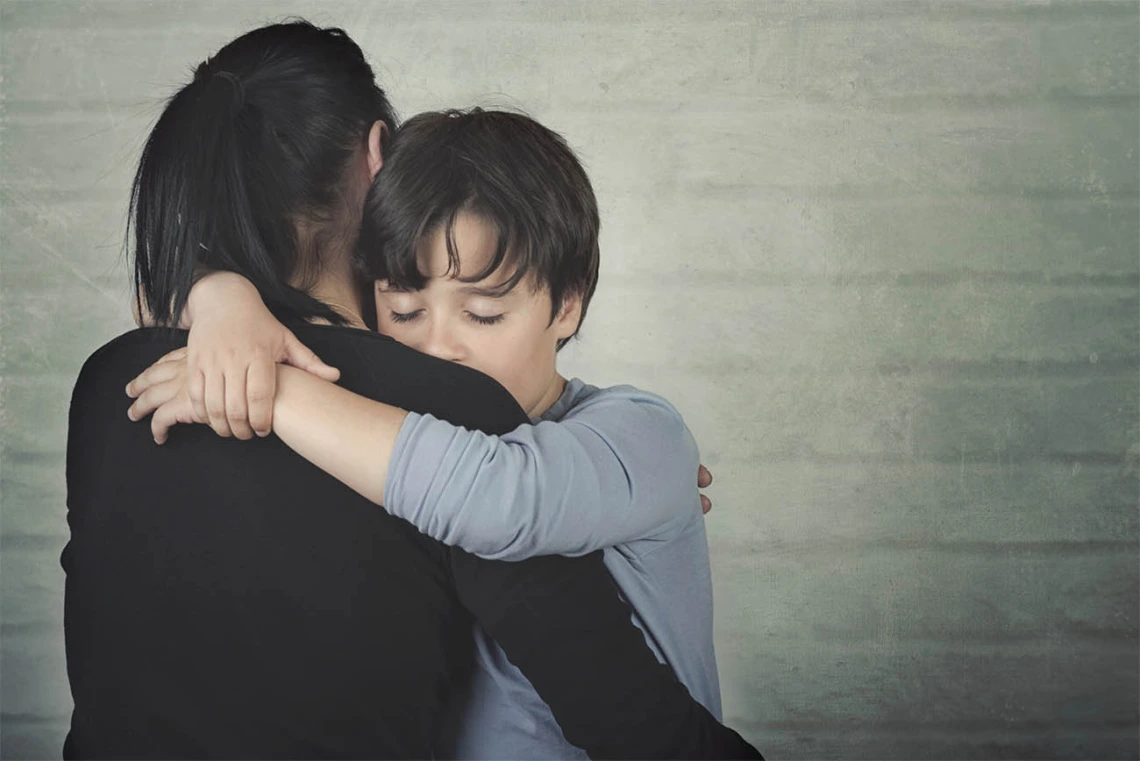
Interventions and therapies aimed at helping people with substance abuse disorders rarely consider family members who may also need support. Project FUTRE hopes to change that by training as many as 100 new behavioral health paraprofessionals.
Growing up with parents who used and abused alcohol and opioids made Cynthia Garcia’s childhood a turbulent one. Years later, and thanks to an innovative new training program at the University of Arizona Health Sciences, Garcia is turning that experience into a force for good by helping others with families like hers.
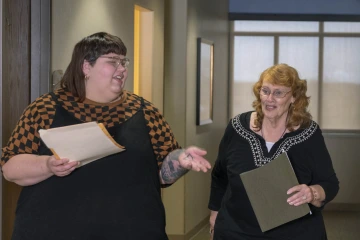
From left: Madison Camacho, 23, and Cynthia Garcia, 66, are using their life experiences and Project FUTRE training to support families impacted by substance use disorders.
Garcia, 66, is taking part in Project FUTRE, which stands for Families Uplifted Through Recovery Education. The program was developed by researchers at the UArizona Health Sciences Comprehensive Center for Pain and Addiction to increase the number of behavioral health paraprofessionals trained to work with children and families whose lives have been upended by opioid use disorder and other substance use disorders.
It comes at a critical time; last year, drug overdose deaths in the U.S. increased to previously unseen levels, surpassing 100,000 in a 12-month period.
“There is an overwhelming need to train and expand a behavioral health workforce that understands and can relate to the unique needs of families and children in crisis, especially surrounding opioid and substance use disorders,” said Todd Vanderah, PhD, interim director of the Comprehensive Center for Pain and Addiction and head of the College of Medicine – Tucson’s Department of Pharmacology.
Project FUTRE meets that need by providing both education and work experience for as many as 100 trainees over the next four years.
Teaching the skills for success
Like Garcia, Madison Camacho, 23, was raised in a home with adults who struggled with drug and alcohol use.
“I have been on the receiving end of services a lot,” said Camacho, who sought out therapy to help her understand her own family and upbringing. “I've seen where there can be more support or where things can be missed in helping someone going through things. I feel that’s a big reason why I have been helpful.”
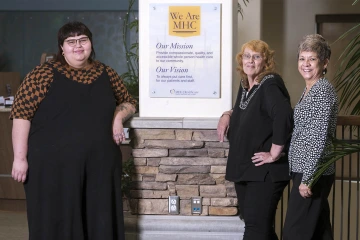
Project FUTRE graduates Madison Camacho (left) and Cynthia Garcia (middle) are apprenticing as family support specialists at the Marana Health Center, where supervisor Pauline Castillo (right) says their peer-to-peer counseling is making a difference in the lives of the families they help.
Originally trained as a hair stylist, Camacho found Project FUTRE after discovering that what she enjoyed the most about being a stylist was helping clients navigate life challenges while they sat in her chair.
“People always joke about treating their hairdresser like a therapist,” Camacho said. “That was true for me. So, I figured out how to make it happen.”
Project FUTRE trainees start by completing six months of online courses that teach myriad skills to support families impacted by addiction.
“I was really interested in the opioid part of the training because I really wanted to understand why my mom behaved the way she did,” Garcia said. “It helped me to understand how opioids change the thinking patterns in the brain. It answered a lot of questions I’d had for a really long time.”
Trainees learn about advocacy, family planning and wellness, and how children are affected when someone in the home has a substance use disorder. They learn what healthy family relationships look like and how to plan for a crisis involving a loved one. They also learn how to work with law enforcement or mental health organizations and what resources exist, not only for individuals with substance use disorders, but also for their families.
“Trainees often have personal experience with or have family member or friends living with substance use disorders or mental health challenges. They use their experiential expertise to support others,” said Allison Huff MacPherson, DHEd, an assistant professor in the College of Medicine – Tucson’s Department of Family and Community Medicine. She, along with Jennifer Schultz De La Rose, PhD, Project FUTRE director of evaluation and director of strategy for the Comprehensive Center for Pain and Addiction, and Benjamin Brady, DrPH, an assistant research professor in the Mel and Enid Zuckerman College of Public Health, oversee Project FUTRE.
Putting it into practice
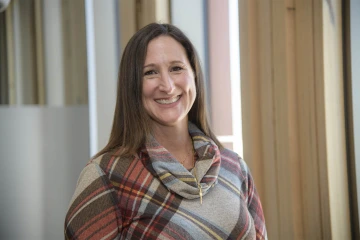
Allison Huff MacPherson, DHEd, is one of three co-investigators for Project FUTRE, which was funded through a $2.2 million grant from the Health Resources and Services Administration of the U.S. Department of Health and Human Services.
Dr. MacPherson directs the first phase of the program in conjunction with the department’s Workforce Development Program. Trainees who successfully complete the six-month program are certified as parent and family support specialists and behavioral health paraprofessionals in Arizona.
Project FUTRE graduates are eligible to apply for a 12-month, full-time paid apprenticeship as phase two of the program. Garcia is completing her apprenticeship at the Marana Health Center in Marana, Arizona.
As part of her apprenticeship, Garcia is working with the family of a young man who uses methamphetamines. She is helping the family change their communication style from accusatory, which causes people to withdraw, to one that is open and understanding.
“It's something that I wished I’d had in my family,” Garcia said of the help she is providing them. “It's very rewarding to see that I’m actually helping someone have a better life.”
Dr. Brady, a member of the Comprehensive Center for Pain and Addiction, says families of those struggling with substance use disorders tend to be left out of interventions and therapy. Anyone with a loved one going into treatment needs support, he says, whether it’s with communication or other skills to help.
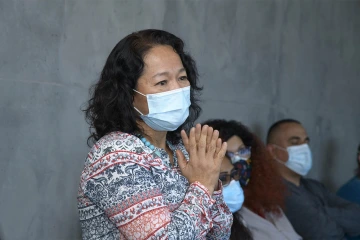
Maria Rios spoke during Project FUTRE’s February graduation event. She is interested in using her certificate to pursue work as a family support specialist..
“The goal of Project FUTRE is to infuse places like Marana with family support specialists who have proven success helping families of those struggling with addiction,” Dr. Brady said, adding that Project FUTRE provides financial support while trainees are learning and completing apprenticeships. “This is the right time for agencies to move forward with it, because someone else is helping with some of the lifting.”
Pauline Castillo, clinical supervisor for the substance abuse team at Marana Health Center and Garcia’s supervisor, says the apprentices have had a notable impact on the agency’s clients in a short time.
“We look for people with life experience with substance abuse or trauma and who have overcome or are working on that themselves,” Castillo said. “They have great insight and understand the tools and support systems they've utilized to be able to function. Our clients like to talk to them. I think they feel like they're not going to be judged. It feels peer-to-peer. I can really see changes.”
Camacho says thanks to the Project FUTRE training and because of the fact that she’s ‘been there,’ she knows how to frame things to reach people, she added.
“I’m not here to tell people what to do, necessarily,” she said. “It's more to help them understand how to achieve what they want. I help them imagine what life could look like.
Contact
Margarita Bauzá
313-520-2109
mbauza@arizona.edu

